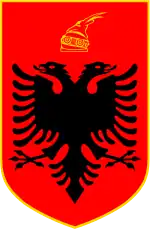Song of Marko Boçari
The Song of Marko Boçari from Suli (Albanian: Kënga e Marko Boçarit nga Suli) is an Albanian polyphonic song of the early 19th century, narrating the death of Markos Botsaris, a Souliot leader.
| Part of a series on |
| Albanians |
|---|
 |
| By country |
|
| Culture |
| Religion |
| Languages and dialects |
History
Markos Botsaris was a leader of the Souliotes. After the beginning of Greek War of Independence he became one of its central figures. He died in Karpenisi, modern western Greece in 1823 during a battle between Ottoman and Souliot forces.
Song
The Song of Marko Boçari from Suli is a narrative and lament of his death. It contains more than 70 octosyllabic lines and was published about fifty years after the event by Thimi Mitko, an Albanian folklorist in his book Bleta Shqipëtare (Albanian: The Albanian Bee).[1][2]
Lyrics
Part of the lyrics:[3]
| Albanian | English |
|---|---|
|
Një harap me karabinë Erdhi Kosta vet i tretë |
A moor with a carbine Kosta himself came with two others. |
Sources
- American Folklore Society (1954). Memoirs of the American Folklore Society. American Folklore Society. Vol. 44. University of Texas Press. p. 173.
In "The Song of Marko Boçari from Suli" (Mitko, ed. Pekmezi, pp.141-143), containing more than seventy octosyllabic lines, only six end in y, all the other lines have as a rhyme or assonance i.
- Pllana, Shefqet (1972). "Studies". Gjurmime Albanologjike:Folklor Dhe Etnologji (Albanological Research: Folklore and Ethnology). 15: 41. Retrieved 2010-06-08.
- Ruches, P.J. (1967). Albanian Historical Folksongs, 1716-1943: A Survey of Oral Epic Poetry from Southern Albania, with Original Texts. Chicago essays on world history and politics. Argonaut. p. 50.